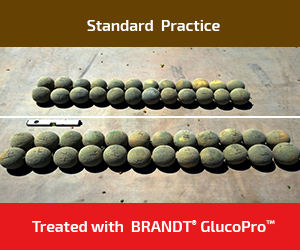Jan 9, 2019BRANDT unveils plant growth regulator with unique mechanism


A proprietary plant growth regulator, called the BRANDT GlucoPro, debuted this week at the Southeast Regional Fruit and Vegetable Growers Conference in Savannah, Georgia.
This field trial photo demonstrates the size, quality and yield advantage of cantaloupe treated with BRANDT GlucoPro compared to cantaloupe treated with grower standard practices.
Ag products manufacturer BRANDT is introducing a proprietary plant growth regulator, called the BRANDT GlucoPro at the Southeast Regional Fruit and Vegetable Growers Conference in Savannah, Georgia this week.
BRANDT GlucoPro is an entirely new plant growth regulator (PGR) molecule, the company said in a news release. The chemistry stimulates plant energy, growth and productivity through a patented mechanism of action that releases tied up sugar inside the plant.
BRANDT GlucoPro has been tested in field trials since 2014, and shows quality and yield increases ranging from 10-37 percent in specialty crops, according to the company.
“BRANDT GlucoPro is based on groundbreaking scientific discoveries,” said Brian Haschemeyer, Director of Discovery and Innovation at BRANDT. “The mechanism of action is truly unique. It is a game-changer for the specialty products market and we’re excited about the impact this technology can bring to growers.”
BRANDT GlucoPro is based off the research and discoveries of Arthur Nonomura, the late Andrew Benson and formulation and field work of BRANDT’s Discovery and Innovation team. Benson is recognized as one of the leading plant scientists of the 20th century. His work included the discovery of the Calvin-Benson Cycle and the Lectin Cycle, which lead to the development of BRANDT GlucoPro.
BRANDT GlucoPro is EPA approved and currently registered in ten states: FL, GA, LA, NC, SC, TX, AZ, NM, OH and ID. Registration is pending in 12 additional states; international registration is expected in 2020. The product is labeled for specialty crops, including brassica, cucurbits, fruiting and leafy vegetables, blueberry, cherry, grapes and sweet potatoes. The product is showing very promising yield advantages on blueberries (26 percent), melons (15 percent), tomatoes (26 percent) and sweet potatoes (37 percent) in particular.














